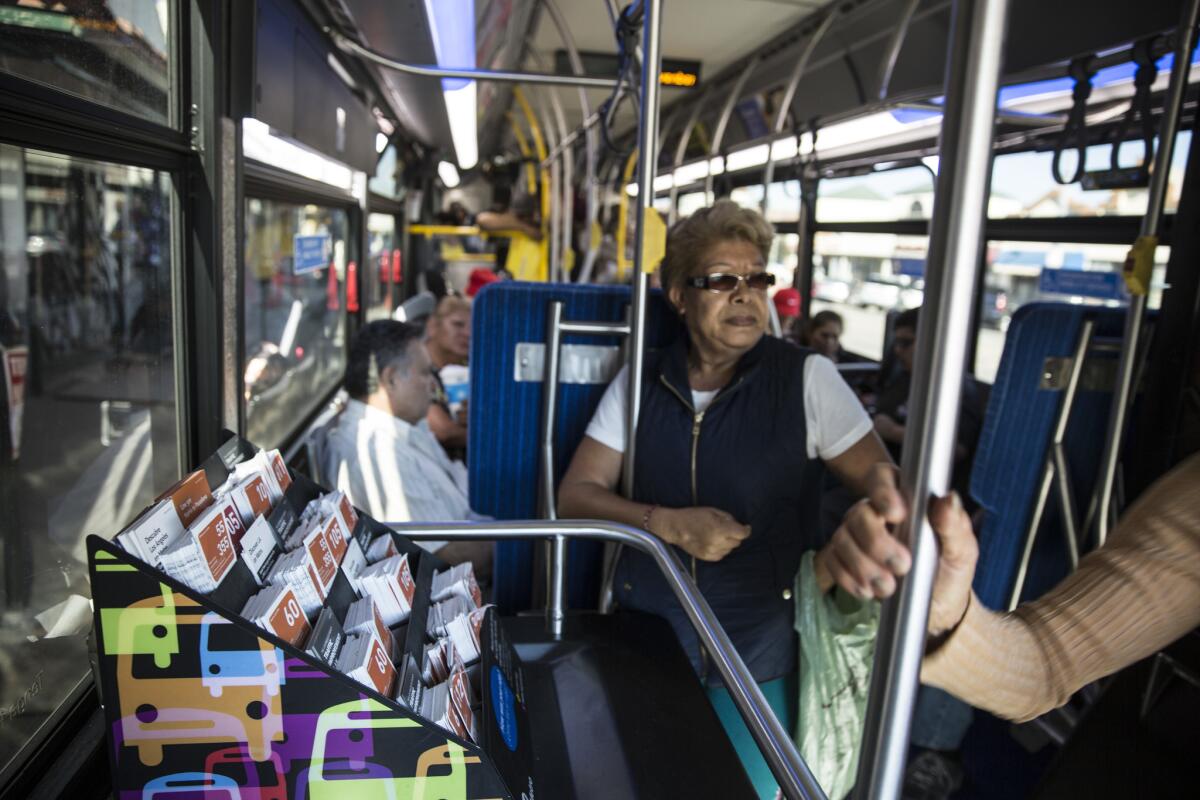L.A. voters consider tax measures to battle homelessness, transit woes

Metro bus riders in Huntington Park. Measure M would fund a massive expansion of rail, bus and freeway routes across Los Angeles County.
They didn’t draw out the long-inflamed passions that the marijuana legalization initiative has. They didn’t carry the solemn consequences of abolishing or expediting the death penalty. They certainly didn’t evoke the fury of the presidential election.
But civic leaders and activists waited anxiously for two local measures that would directly affect anyone who lives or drives on the streets of Los Angeles for decades to come.
No measure on the ballot Tuesday could shape the future of Los Angeles more than Measure M, which would fund the most ambitious transit expansion in Los Angeles County history.
And Proposition HHH would help build as many as 10,000 apartments as part of a broader push to get homeless people off the streets and sidewalks in Los Angeles.
Both measures were leading in early returns Tuesday night.
Mayor Eric Garcetti has been a strong advocate for both measures.
In an advertisement for Measure M, filmed as he was driving his car, Garcetti called it “something that will help relieve traffic and literally change our lives.”
At a party for the measure Tuesday night, Garcetti said the early results looked “very promising.”
“I’m superstitious,” Garcetti added. “I don’t ever declare victory until the end.”
Measure M would raise the county sales tax by a half-penny, generating an estimated $120 billion over four decades for the Metropolitan Transportation Authority to build new highway projects and expand bus and rail lines, including boring twin rail tunnels through the Sepulveda Pass.
The rail system would expand to Pacoima, Claremont, Westwood, Torrance and Artesia. The tax would also fully or partly fund 10 highway projects, such as an extension of the freeway on State Route 71, and a new carpool-lane interchange between the 405 and 110 freeways.
Measure M would raise the county’s base sales tax rate by half-cent in 2017 and increase it to 1% in 2039 after another half-cent sales tax expires. The levy would continue until voters chose to end it.
Patrick Janssen, 30, a sound mixer for film and television, voted for the measure at his polling place in Los Feliz.
“Any attempt to improve transit — please, please, please. It’s my least favorite thing about this city,” he said.
Traffic always ranks high among concerns for residents of this relentlessly clogged metropolis. But critics have warned that because Measure M has no end date, voters may find it difficult to hold Metro accountable for cost overruns and schedule delays that have beset many agency projects in the past. And city leaders in the South Bay — where rail lines are scarce — opposed it because the northern parts of the county get their projects first.
Like all tax measures, both Measure M and Proposition HHH need a two-thirds majority to pass.
The city homeless housing initiative would authorize $1.2 billion in borrowing to accelerate the pace at which mostly nonprofit developers build permanent supportive housing for chronically homeless people. The bonds would be repaid by a new property tax averaging just under $9.64 for each $100,000 in assessed valuation each year over 29 years.
The owner of a $1-million property would pay, on average, $96 every year. The owner of a home with a median assessed value would pay about $32 a year.
City officials who placed the measure on the ballot say it would help fund 1,000 apartment units a year for 10 years. Los Angeles County would provide the support services for the city housing.
After years of ineffective efforts to stem the spread of tent encampments that now dot the city, the bond measure is an ambitious approach to achieve a long-term solution. If approved, it would have little immediate effect, leaving the city and county struggling to gain traction with short-term efforts, including offering services to those living on the street and finding placements in existing housing.
On skid row, voters hobbled out of their tents and welfare hotels in force Tuesday, lining up at times to cast ballots at four polling stations in the 50-block district.
They were prodded by a registration campaign, phone banking and the housing measure.
“I need help and my brother here needs help,” said James Evans as he and friend David Chavarria sat outside Midnight Mission in wheelchairs. He hoped the measure could get them off the streets one day.
Proposition HHH had the backing of much of Los Angeles’ political leadership and civic groups. United Way of Greater Los Angeles and the Los Angeles Area Chamber of Commerce are coordinating the campaign. Opponents, who argue that the city should use existing revenue to address homelessness, have not formed a campaign committee or raised funds.
Though no polls specifically aimed at Proposition HHH have been published, voters have consistently rated homelessness as one of the city’s top issues.
A number of other California communities are also using the ballot to address their own acute homelessness crises.
In the most ambitious bid, San Francisco’s Proposition J was seeking $1.2 billion over the next quarter century for homeless services, including housing, and $2.4 billion to beef up public transit, fix roads and improve pedestrian safety.
At the state level, Gov. Jerry Brown signed a bill in July allocating $2 billion for housing for homeless people with mental illness. The money will come from the state’s Mental Health Services Act, funded by the Proposition 63 millionaire’s tax approved by voters in 2004.
Twitter: @joemozingo
Twitter: @latdoug
Twitter: @laura_nelson
UPDATES:
11:38 p.m.: This article was updated with a comment from Mayor Eric Garcetti.
This article was originally posted at 9:15 p.m.
More to Read
Sign up for Essential California
The most important California stories and recommendations in your inbox every morning.
You may occasionally receive promotional content from the Los Angeles Times.













